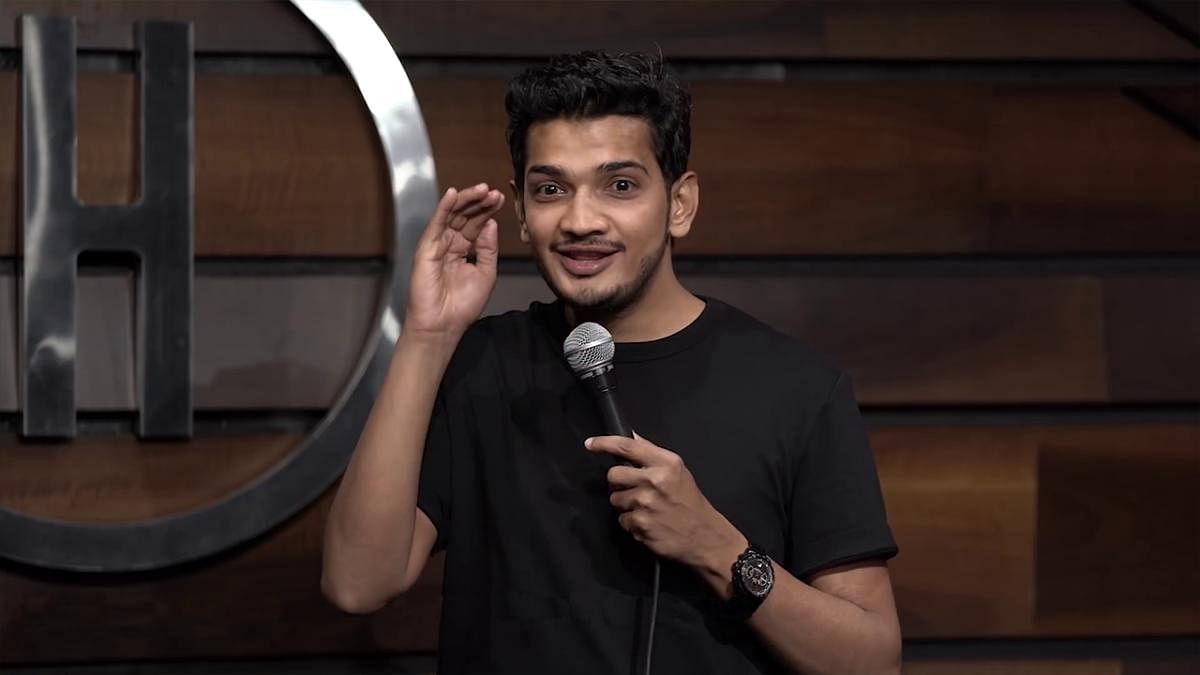
The back-to-back cancellation of standup shows by Munawar Faruqui and Kunal Kamra in Bengaluru has shocked the artist fraternity.
A progressive city like Bengaluru has set a wrong precedent by giving in to the demands of fringe elements, many Showtime spoke to said.
Munawar is out on bail granted by the Supreme Court. He was arrested on January 1 for hurting Hindu sentiments with a joke that he, ironically, never cracked.
As for Kunal, he has been openly critical of the ruling BJP’s policies.
Cautious ahead
A question Munawar has been asked is why he doesn’t make fun of his religion. Artistes say this criticism is untrue, and it also distracts from the real debate.
Fellow comedian Arnav Rao says: “In July 2020, a clip of mine surfaced online. In that, I talk about why I joke about Hindu gods and not others. I am a Hindu, that’s why. Then came the trolls, who asked me to make fun of other religions too. So the real issue is about groups who want to create trouble and get mileage for their political careers.”
Artistes are now cautious about what they post online. Standup comic Navin Kumar has consulted Arnav, a lawyer by training, to assess if his content is safe to go out on the Internet. “It’s exhausting to work like this,” he says.
Rapper Gubbi aka Karthik Sundar shares this exhaustion: “What should we make then? Happy things? Rapping is about saying things as is and giving a voice to the voiceless.”
As a thumb rule, Sonu Venugopal, comic and creator of video sketches, avoids posting anything related to religion. “If you want to be in this field for a long run, you have to strategise,” she says.
But trolls always throw a curveball. Hear it from Sonu: “When I shared Munawar’s post, where he had written ‘Hatred won, artiste lost’, a few people said they would unfollow me because I was expressing solidarity with him.”
Intolerance is everywhere, says Alex Mathew, who performs as the drag queen Maya. “At a party in Bengaluru, a drag artiste made a remark against PM Modi and the DJ, who was seemingly pro-BJP, gave him a death stare. I had to intervene,” he says.
‘We are self-censoring’
“Arts is already under threat,” says theatre practitioner Karthik Hebbar from Bengaluru. He gives the example of ‘Shiva’, a play on the discrimination faced by the LGBTQ community. He had done musical production for it.
In 2018, its director Dayasindhu Sakrepatnae was forced to call off the show after two right-wing outfits objected to the title, arguing it insulted the Hindu god. The Whitefield police did depute three cops at Jagriti Theatre, the venue, but the protection wasn’t adequate to carry on with the show.
The show was planned in the wake of Section 377 being scrapped. “Art is always anti-establishment, so somebody, somewhere, will always take offence to our ideas. These groups are hounding Munawar relentlessly, without being questioned by the police, and that is unprecedented. Today, it’s him, tomorrow, it can be us,” he complains while admitting that theatre groups are “sadly, self-censoring”.
Writer Yogesh Master says, “Moral policing has taken over policing in this country.” In 2013, he was arrested after right-wing Hindu outfits in Bengaluru objected to the portrayal of god Ganesha in his book, ‘Dhundi’. During a visit to Davanagere in 2017, some men smeared his face with black oil. “Even today, I need police protection when I deliver lectures,” he says.
‘Youth worries’
If the law and order authorities don’t stand by artistes now, youngsters will shy away from the arts, they fear.
“Youngsters are the future. By silencing them and their experiments, we are hindering critical thinking and introspection on social and political matters, which, for instance, comedians do quite well,” says Yogesh.
‘We will find a way’
Comics writer Falah Faisal compares Munawar episode’s to what American standup comic and satirist Lenny Bruce was subjected to. He was jailed multiple times through the 1950s and ‘60s for performing 'obscene material'.
“But his trial paved the way for free speech in comedy in America. I hope Munawar’s fight doesn’t go in vain,” says Falah, who was asked to leave a venue in Indiranagar last year for selling posters in the costume of 'Musalman', a Muslim superhero character he has created.
He feels the more you try to curtail artistes, the more creative they become. “We will find a way,” says Falah.